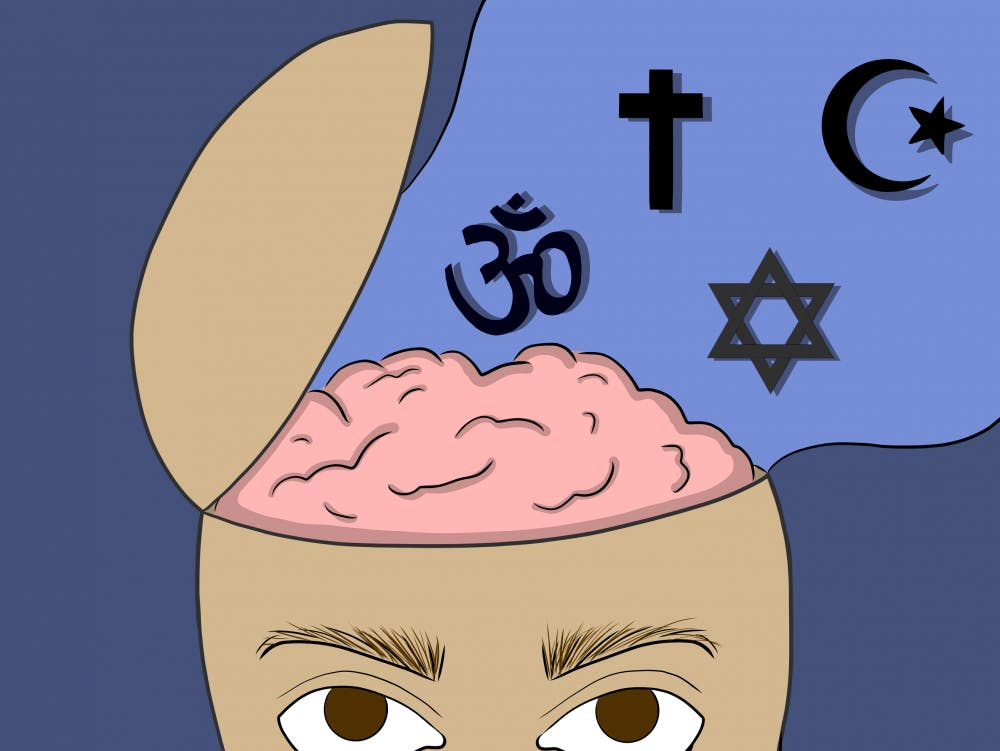Religion can be a difficult subject to bring up in everyday conversation on campus with the popular perception that it is a subject best left avoided.
But I worry this lack of dialogue only deepens a knowledge deficit ASU students suffer from; they know very little about religion beyond their own personal experiences.
Whether it be awareness of the fundamental beliefs of world religions, the differences between major religious sects or the role of religion in political and social conflict in the U.S. and beyond, in my own experiences, I have seen a lack of awareness when religion comes up – in and out of the classroom.
Although this is a big problem, especially in a world where religion is playing as important a role as ever, there is a simple solution: have a religious requirement for all undergraduate ASU students, so students can leave this University with the knowledge necessary to live on a more connected planet.
Religion is a focus of the humanities, arts and design and the social-behavioral sciences studies in the University's core areas of general studies and courses pertaining to religion can fulfill the historical awareness credit requirement, but the topic needs to made a separate core area itself.
“It would actually be very good if we had the chance to really talk to and educate students about the significance of religion today,” said Alexander Henn, the director of undergraduate studies at ASU’s School of Historical, Philosophical and Religious Studies. “For most (students), it’s still more related to personal beliefs and personal opinions, but there’s not much of an understanding of what religion is worldwide and how it should be seen.”
The concept of out-of-major prerequisites for graduation isn't new. Along with courses for each ASU major, there are several course requirements undergraduate students have to fulfill, including courses that satisfy historical and global awareness requirements, so why not add one for religious awareness?
Joel Stoker, a faculty associate in religious studies at the School of Historical, Philosophical and Religious Studies, said that while today's students probably know more than their parents and grandparents about religion, Americans generally have little knowledge of the many religions the world contains.
“A significant problem in the American education experience is the lack of understanding about religion,” Stoker said. “That is pretty remarkable considering how religious the American public is.”
Stoker emphasized that among a world population that is “less isolated” than ever before, awareness of different religions is vital to keep up with the diversity of the modern world.
“My guess is that most religious studies scholars would contend a world religions course might be the most appropriate (course) in order to fulfill such a requirement,” Stoker said. “It doesn’t specialize in and doesn’t focus too much time on one particular religious ideology, but it opens up the door to all of the major world religions.”
While there are declining rates of religious affiliation in the U.S., according to a study by Pew Research Center, 83 percent of all Americans identify with a religion, along with 74 percent of Americans aged 18 to 29.
Although religion is definitely declining in influence in much of Europe and the U.S., other parts of the world, such as Muslim-majority nations, are becoming more religious than ever. In fact, it is estimated that by 2050, more people worldwide will be religiously affiliated than they are today, with Muslims predicted to be the group with the largest population increase.
For many, it can be easy to forget the central role that religion plays in millions of people's lives, both in the U.S. and around the world. Just domestically, sociopolitical issues like abortion, separation of church and state and LGBT rights often center on the role of religion. Often, one’s own religion can be a predictor of where they will fall on these issues.
Yet, a Pew Research poll found that Americans were fairly unaware of certain religious tenants or facts. A majority did not know the names of the Four Gospels, one of the main tenets of Protestantism regarding salvation, or that most people in Indonesia (the largest Muslim-majority nation in the world) were Muslim.
We are a generation with more access to information than ever, but religion is not something that should require self-education. ASU needs to take the lead in helping students understand the ever-globalizing world by making a religious studies requirement.
“It is not just a thing for which you want to go into because you are personally interested," Henn said. "It is really something that is essential and critical to our modern world. There is much to learn about other people’s religions, many prejudices to overcome. So it is a matter of global understanding and learning.”
Reach the columnist at Marinodavidjr@gmail.com or follow @Marinodavidjr on Twitter.
Editor’s note: The opinions presented in this column are the author’s and do not imply any endorsement from The State Press or its editors.
Want to join the conversation? Send an email to opiniondesk.statepress@gmail.com. Keep letters under 500 words and be sure to include your university affiliation. Anonymity will not be granted.
Like The State Press on Facebook and follow @statepress on Twitter.




